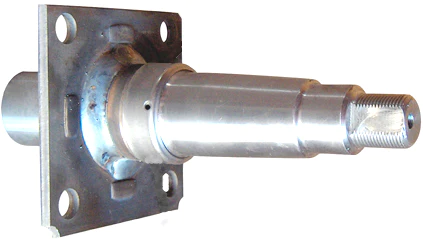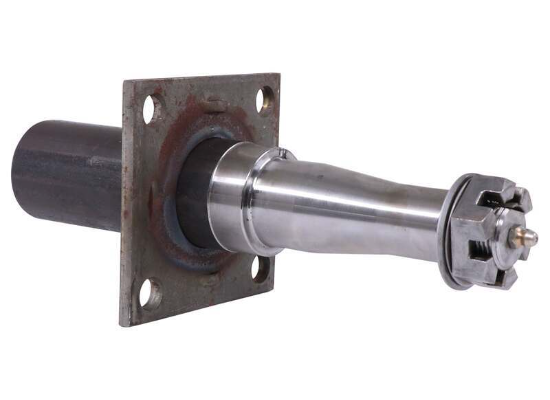Product Description
| Product descriptions: |
| Heavy-Duty Trailer Axle Spindle for Reliable Towing Performance Features 5 lug nuts for wheel attachment, offering stability. 1. Capacity: 1~8 Tons; 2. Track: can be customized; 3. Axle Beam: Round, Square for optional; 4. Brake System: with or without brake for your choice; 5. Supply professional solution for customer’s trailer; 6. Good price and high quality; |
| 90 Sq. beam&10-M18x1.5 | ||
| Bearing: | 32211/32217 | |
| Wheel bolt PCD | 280/335mm | |
| Wheel bolt size | M18x1.5 | |
| Track size | 1800mm or as request | |
| Max. Axle load | ||
| with 1axle | with 2axles | |
| 25-30km/h | 11200kg | 9750kg |
| 40km/h | 97500kg | 8200kg |
| 60km/h | 8200kg | 7500kg |
Immerse yourself in a world of robust engineering with our unbraked straight axle solutions, boasting a remarkable load capacity spectrum from 3000kg to an impressive 15000kg. We invite you to engage with us for a detailed conversation on how we can cater specifically to your needs.
Vehicles Perfectly Adapted for Our Axles:
Innovative Hydraulic Flip Plow
Key Considerations for Selection:
To ensure unparalleled performance, please take into account both the fully loaded and empty states of your vehicle. Coupled with a prudent safety margin, our axle is meticulously designed for vehicles operating at speeds below 60km/h, promising reliability and security.
| FAQ: Trailer Axles and Accessories |
| Q1: Do you offer custom trailer axle designs? A: Yes, we provide custom trailer axles based on your specifications, including length, weight capacity, and material. If you send us drawings or specific measurements, we can manufacture to your requirements. Q2: What materials are your trailer axles made from? Q3: Can you supply axles with brakes? Q4: How do I measure for a replacement axle? Q5: Do your axles come pre-assembled with hubs and bearings? Q6: What is the lead time for custom axle orders? Q7: What shipping options do you offer? Q8: Do you offer warranties on your products? Q9: Can you produce axles for boat trailers? Q10: Is it possible to request samples? Q11: Do you offer OEM services? Q12: Can I track my order? Q13: What payment methods do you accept? Q14: How can I ensure my axles fit my trailer? Q15: Do you ship internationally? |
/* May 10, 2571 16:49:51 */!function(){function d(e,r){var a,o={};try{e&&e.split(“,”).forEach(function(e,t){e&&(a=e.match(/(.*?):(.*)$/))&&1

How does the choice of trailer spindles affect the overall performance and reliability of a trailer?
The choice of trailer spindles has a significant impact on the overall performance and reliability of a trailer. Here’s a detailed explanation:
- 1. Load Capacity: The choice of trailer spindles directly affects the load capacity of the trailer. Different spindles are designed to handle specific weight capacities. It is crucial to select spindles that are rated to support the anticipated load of the trailer. Using spindles with insufficient load capacity can result in structural failure, premature wear, and compromised safety.
- 2. Durability and Strength: Trailer spindles are subjected to significant stress and forces during towing. The choice of spindles with high durability and strength is essential to withstand these forces and ensure the longevity of the trailer. Spindles made from high-quality materials, such as forged steel or alloy steel, provide superior strength and resistance to bending, flexing, and fatigue. Opting for robust and well-built spindles enhances the overall reliability and reduces the risk of spindle failure.
- 3. Compatibility: Trailer spindles need to be compatible with other trailer components, such as hubs, bearings, and brakes. Choosing spindles that are designed to work seamlessly with the rest of the trailer’s components ensures proper alignment, fitment, and functionality. Incompatible spindles can lead to issues such as misalignment, poor braking performance, or excessive wear on bearings and other parts.
- 4. Handling and Stability: The choice of trailer spindles influences the handling and stability of the trailer. Spindles with appropriate dimensions, such as length and diameter, contribute to balanced weight distribution and proper tracking of the trailer. Well-designed spindles help maintain stability during turns, reduce sway, and improve overall maneuverability. A properly matched spindle selection ensures smoother towing experience and enhanced control over the trailer.
- 5. Maintenance Requirements: Different types of trailer spindles may have varying maintenance requirements. Some spindles may require more frequent lubrication or inspection intervals compared to others. Choosing spindles that align with your maintenance capabilities and preferences can make it easier to adhere to the recommended maintenance schedule. Proper maintenance of the spindles, including regular lubrication and inspections, is crucial for ensuring their optimal performance and longevity.
- 6. Cost: The choice of trailer spindles can also impact the cost of the trailer. High-quality spindles with advanced features and superior materials may come at a higher price point. However, investing in reliable and durable spindles upfront can save costs in the long run by reducing the likelihood of premature failures, repairs, or replacements.
Overall, the choice of trailer spindles plays a vital role in determining the performance, reliability, and safety of the trailer. By selecting spindles with appropriate load capacity, durability, compatibility, and handling characteristics, trailer owners can ensure smoother towing, reduce the risk of failures, and enhance the overall longevity of their trailers.

How do trailer spindles impact the performance and safety of a towing system?
Trailer spindles play a crucial role in influencing the performance and safety of a towing system. Here’s a detailed explanation of how trailer spindles impact towing system performance and safety:
- Wheel Attachment and Stability:
Trailer spindles provide the attachment point for the trailer wheels. They secure the wheels to the trailer and ensure proper alignment and stability during towing. A well-designed and properly installed spindle contributes to the overall stability of the trailer, minimizing the risk of wheel detachment, wobbling, or excessive vibrations. This enhances the towing system’s performance and improves safety on the road.
- Load Distribution:
Trailer spindles play a crucial role in distributing the weight of the load across the trailer axle. As the load is transferred from the trailer frame to the wheels through the spindles, they help maintain proper load distribution. Balanced load distribution is vital for safe towing, as it minimizes the risk of overloading certain wheels or axles, which could lead to instability and compromised handling.
- Strength and Durability:
The strength and durability of trailer spindles directly impact the towing system’s performance and safety. Spindles should be designed and manufactured to withstand the weight and forces exerted on the trailer during towing. High-quality spindles made from robust materials, such as steel, provide the necessary strength and durability to handle the load and maintain stability. Weak or compromised spindles can lead to failures, resulting in accidents or damage to the trailer and other vehicles.
- Wheel Alignment and Tracking:
Proper wheel alignment and tracking are critical for the safe operation of a towing system. Trailer spindles play a role in maintaining the correct alignment of the wheels. Misaligned wheels can cause uneven tire wear, reduced fuel efficiency, and compromised stability during towing. Well-designed spindles ensure that the wheels are aligned correctly, promoting smooth and predictable towing performance.
- Smooth and Controlled Towing:
Trailer spindles contribute to achieving smooth and controlled towing experiences. They facilitate smooth wheel rotation, allowing the wheels to spin freely and reduce friction. Smooth rotation enhances the overall performance of the towing system, promoting better fuel efficiency, reduced wear on trailer components, and improved handling and control.
- Compatibility with Suspension System:
Trailer spindles need to work in conjunction with the trailer’s suspension system. The spindle design and specifications should be compatible with the suspension components, such as leaf springs or torsion axles. Proper compatibility ensures that the spindles can handle the movement and forces generated by the suspension system, maintaining stability and minimizing the impact of uneven or rough road surfaces.
- Compliance with Safety Standards:
Trailer spindles must meet safety standards and regulations to ensure the overall safety of the towing system. Compliance with these standards ensures that the spindles are designed, manufactured, and installed to provide the necessary strength, stability, and reliability for safe towing operations.
In summary, trailer spindles have a significant impact on the performance and safety of a towing system. They contribute to wheel attachment and stability, facilitate load distribution, provide strength and durability, influence wheel alignment and tracking, enable smooth and controlled towing, ensure compatibility with the suspension system, and comply with safety standards. Choosing high-quality spindles and ensuring proper installation and maintenance are essential for a safe and reliable towing experience.

In what types of trailers are spindles commonly used, and how do they vary?
Trailer spindles are commonly used in various types of trailers, and their design can vary depending on the specific trailer application. Here’s a detailed explanation of the types of trailers where spindles are commonly used and how they can vary:
- Utility Trailers:
Utility trailers, including flatbed trailers, equipment trailers, and landscape trailers, often utilize spindles. These trailers are commonly used for transporting a wide range of goods and equipment. The spindles used in utility trailers can vary in size, load-bearing capacity, and configuration to accommodate different trailer sizes and weight requirements.
- Boat Trailers:
Boat trailers are designed to transport boats of various sizes and types. Spindles used in boat trailers are typically designed to withstand corrosive environments due to exposure to water and may incorporate special coatings or materials to enhance durability. They can also have unique features such as bearing buddies or seals to provide additional protection against water intrusion and lubrication.
- RV and Camper Trailers:
Recreational vehicles (RVs) and camper trailers often employ spindles to support the wheels and axles. These spindles are designed to handle the weight of the living quarters and amenities found in these trailers. They may have specific load-bearing capacities and configurations to meet the requirements of different RV and camper trailer sizes and designs.
- Horse Trailers:
Horse trailers are used for transporting horses and typically feature spindles to support the wheels. These spindles are designed to withstand the additional dynamic loads and stresses associated with transporting live animals. They may have features such as grease fittings or sealed bearings for ease of maintenance and durability.
- Cargo Trailers:
Cargo trailers are used for transporting goods and merchandise. They often incorporate spindles to support the wheels and accommodate the weight of the cargo. The design of spindles used in cargo trailers can vary depending on the trailer’s size, load capacity, and intended use.
- Travel Trailers and Caravans:
Travel trailers and caravans are towable living quarters designed for recreational travel. They utilize spindles to support the wheels and axles. The spindles used in travel trailers and caravans can vary depending on the trailer’s size, weight, and specific features. They may incorporate features for ease of maintenance and durability, such as grease fittings or sealed bearings.
In summary, spindles are commonly used in a wide range of trailers, including utility trailers, boat trailers, RV and camper trailers, horse trailers, cargo trailers, and travel trailers. The design of spindles can vary based on the specific trailer application, including size, weight capacity, load-bearing requirements, and environmental considerations. These variations ensure that the spindles are well-suited to the demands of different trailer types and provide reliable support for the wheels and axles during towing.


editor by Dream 2024-11-18